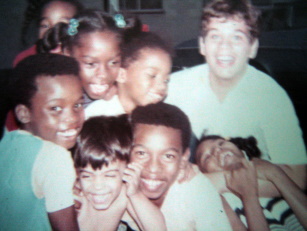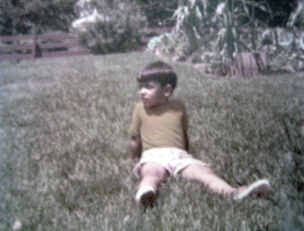 It wasn’t too long ago that I was in New Smyrna Beach, Florida, sitting in the local steakhouse at the bar next to a then friend who kept introducing me as being from Trinidad, a prop of the exotic in retrospect, but a burden. So I spoke to him about it, because it’s factually incorrect.
It wasn’t too long ago that I was in New Smyrna Beach, Florida, sitting in the local steakhouse at the bar next to a then friend who kept introducing me as being from Trinidad, a prop of the exotic in retrospect, but a burden. So I spoke to him about it, because it’s factually incorrect.
I’m not from Trinidad, I grew up in Trinidad and am a naturalized citizen. I’m from Milwaukee, Wisconsin, but I left there when I was 3, left Ohio when I was 9, and so on, and so on.
I left, a bit aggravated, and when he and I spoke next he said the bartender – who had a PhD in sociology – pointed out that he was encroaching on an identity that I had built over the years, which I knew but didn’t know about why I was upset. There were other things about it. Being from outside the U.S. comes with a stigma when within the U.S., just as being from the U.S. comes with a stigma when outside the U.S.
 What makes it more complicated is how I came about my identity. The picture on the right includes a toothy version of me at bottom, 2nd from left. These were my friends in Milwaukee. Notice anything? I didn’t. These were just my friends. I was the baby of the group, and while I do not remember them, and they likely don’t remember me, I viewed this as normal. This was, after all, my life, and I was about 3. We got into trouble together, though I suspect I got into trouble more. We were all judged about the same with the only distinction age, the tyranny of time.
What makes it more complicated is how I came about my identity. The picture on the right includes a toothy version of me at bottom, 2nd from left. These were my friends in Milwaukee. Notice anything? I didn’t. These were just my friends. I was the baby of the group, and while I do not remember them, and they likely don’t remember me, I viewed this as normal. This was, after all, my life, and I was about 3. We got into trouble together, though I suspect I got into trouble more. We were all judged about the same with the only distinction age, the tyranny of time.
 For reasons I didn’t quite comprehend, we whisked off to Dayton Ohio, where I traded a rich life of friends for a suburban backyard with a dog, not by choice, but by circumstance. My parents had the votes, I had… the results. I grew to like that life, running around, peddling a bicycle around, and then one day, I found out something.
For reasons I didn’t quite comprehend, we whisked off to Dayton Ohio, where I traded a rich life of friends for a suburban backyard with a dog, not by choice, but by circumstance. My parents had the votes, I had… the results. I grew to like that life, running around, peddling a bicycle around, and then one day, I found out something.
I was brown.
Now, of course I knew I was brown. My father was browner. His parents were also browner. But up until a magical day when some kid broke an antenna off my father’s project car, an old Duster, and he lodged a complaint with the kid’s father, who happened to be a cop, I heard the term ‘Spic’. Understand, my father’s side of the family is predominantly East Indian by way of Trinidad, so that particular slur doesn’t make sense to me, and when I asked my mother about the term – my father was not in the mood to be asked, I remember that – I was told simply that it was, “a word we didn’t use.” It was 1978, I was 8, and it made no sense to me as many things didn’t, so I was quickly distracted by peanut butter cookies.
Not too long after, I was kissed by a lovely girl named Jenny in her treehouse nearby, and was informed that I was her boyfriend. She even dedicated a song to me in Music Class as she played the drums. “Don’t Bring Me Down” by Electric Light Orchestra. We went skating to Pink Floyd’s “The Wall”, singing at the top of our lungs in true 1970s fashion. Fun goofy kid stuff.
Until one day, the kid who broke my father’s antenna caught me on the way home from school with a baseball bat and told me to leave her alone before knocking me out with it. I wasn’t a tough kid then. I was a kid who laughed, who smiled, who was polite… not perfect in school. My friends got me home where I lay on the plush ‘baby turd brown’ couch (it was the 1970s) with my mother worrying over me, telling me not to go to sleep.
I felt anger. Rage. Frustration. And so I did find that kid after school one day and I lost that fight, so the next day I fought him again. I lost that one too. And the next one, and the next one, and the next one. Every busted lip and bruise was answered at home with, “fell off my bike”. My father worked nights, my mother was easy to convince. One day, though, I won. During all of this, I don’t remember Jenny at all. It’s as if she disappeared.
This was my introduction to racism, and this was my response to it. Decades later I would note that even though I had encountered it, all but a few times they hated me for being a race that I wasn’t.
Soon after, I was sent down to Trinidad by my parents, where everything was inverted as far as the color of people. People of European descent were the minority – still are – and everyone else is a shade of brown, or of Asian descent. It meant going from being hated for one reason to another, as I still had the American accent and was not considered Indian enough by some, White enough by others, and not black enough by still others. Add to that going from a Jehovah’s Witness to my father’s side of the family practicing Hinduism, and things got really hairy about who I was, on top of everything else. My mother didn’t come down, my parents divorced, and life was at best a turmoil before and during adolescence as I constructed from the bits and pieces of everything… who I was.
It was my own gauntlet. My own forge, surrounded by tribes, alone, trying to fit in while remaining an individual with those awkward hormones not helping matters at all. I worked in the family businesses not because I was industrious – I was – but because my social life simply didn’t exist. I didn’t belong anywhere, so I occupied myself in ways that would at least gain some form of respect from my elders. Rewinding motors, offset printing, and early failures at sales for both. Give me a computer, though, and I could change the world – that’s what I thought, anyway.
I couldn’t afford weights, so I lifted bricks. I never backed down from a fight and sometimes, if I’m honest, went looking for fights because things at home were less than stellar. The kid who laughed and smiled was pretty much a facade. I had forged myself into someone tough. Into someone that people didn’t mess with. I leveraged printing from the family business into a free gym membership. I leveraged every moment with a computer to become a computer programmer. When the business was bad, I subsisted on what was available. I went one two week period rationing a jar of peanut butter that I had bought on my own.
This, you see, is a lot of identity to build. Leaving Trinidad at 16, I got my father to sign my emancipated minor status when I went to college in Irving, Texas, and from there I worked, I went to school, then I worked and didn’t go to school when I got programming gigs. Student Aid was a joke. I wasn’t black enough for this, hispanic enough for that. I fell through the cracks of the late 1980s of equal opportunity, but what I could count on was… myself.
Strangely, I only encountered a small amount of racism in Texas at the time, surrounded by friends of all shades. I melted into this world, and lost what I was trying to do somewhere along the line. I drove to Oklahoma, to New Mexico, to Louisiana, to Arkansas, to Mexico. I did what I had to do to make ends meet, and I saw an America that was not the America I thought it was when I was abroad – as happens.
And then I ended up in New York City repairing commercial dishwashers before I joined the Navy. When I signed my contract, a friend of mine who was, and I imagine still is, of African descent decided to go out drinking (underage). We hung out in CBGBs, had all sorts of fun, and the week before he headed off to bootcamp, we were out in the village when some angry biker chick shouted across the street that, “N****** and Spics ain’t allowed ’round here”. So, we got our asses kicked by bikers and rode the subway to sobriety. I mean, in retrospect, why didn’t we see bracing the biker gang was a bad idea?
And why is it that I don’t use the word in Tom Sawyer, but calling people of latin descent ‘spics’ is allowed? Why is that permitted?
My recruiter, by the way, noted that I was hispanic so I could get more points for him. ‘Equal Opportunity’ my ass.
Now, all of that said, those account for my first 20 years. The Navy wasn’t bad. In fact, once I got out of the nuclear pipeline, it was pretty good. People liked or hated me for the right reasons, which was a nice recalibration. Upon getting out, I taught medical technicians in Harlem. I had a lot of explaining to do one night with a non-stock 1985 Chrysler Laser with a hatchback, where IV needles and my Florida plates took some explaining to a white cop in Harlem, but I got through that unscathed.
I returned to Florida, where I had been stationed, and ended up being a team leader at a blood bank where I was respected and liked, then dove into programming again for Honeywell where I encountered racism only once where I was referred to by a Sand-N****r by someone who I simply ignored and outperformed and outlasted.
Now, all this time, I never lied about who I was. I refused to do that, I still do, because if a person – or as I was taught growing up, a man – betrays his word, he is nothing. And of all the things I could be, I knew I was not nothing.
I became an individual, a tribe of one, not because of some innate need to be an individual but as a survival trait. When I had forms to fill out and they asked about the artificial construct of race, I wrote ‘Other’. When asked to explain, I wrote, “None of the above.”. This may have even cost me jobs where, had I lied, I might have gotten an equal opportunity hire.
As I grew into that career, that path of software and consultation, my only enemy was bullshit, regardless of how I was seen and I developed a reputation for that. I grew as far as I could by merit, not by handouts, not by stepping stones of equal opportunity and ‘diversity’ – diversity in practice being a way to simply re-emphasize divisions to give the illusion of progress. I worked on my communications skills, and was suddenly gifted by a man from Puerto Rico, a Scottish Jew and a guy from deep Florida with the humanities, something I had lacked in my formative years. And I grew, and I liked who I became despite not liking some of the things I had been to get to where I was.
Because of this, and more, when someone tries to pin me to being a Democrat or a Republican, UNC or PNM (Trinidad politics), Indian or white, or even says if I choose otherwise that I’m only ‘helping the other side win’, there’s a 50 year old ass ready for their lips.
I don’t care about your tribes. I care about the issues.
My tribes are about issues, and I do not join easily. Where you see me is because of who I am, not because of who I’m surrounded by, not because of some accident of geography, not because of some accident of parentage.
I am a tribe of one. I know others like me. We exist. Some call us Third Culture Kids, but we’re all different, different parents, different cultures, different circumstances. We are whole, and we can think and speak for ourselves because we did not have a choice.
We simply exist.

 Today, Vladimir Putin made quite the statemet regarding sovereignty and colonies. The truth of the statement is without question. There is no in intermediate state: either a country is sovereign or it is a colony.
Today, Vladimir Putin made quite the statemet regarding sovereignty and colonies. The truth of the statement is without question. There is no in intermediate state: either a country is sovereign or it is a colony.  It wasn’t too long ago that I was in New Smyrna Beach, Florida, sitting in the local steakhouse at the bar next to a then friend who kept introducing me as being from Trinidad, a prop of the exotic in retrospect, but a burden. So I spoke to him about it, because it’s factually incorrect.
It wasn’t too long ago that I was in New Smyrna Beach, Florida, sitting in the local steakhouse at the bar next to a then friend who kept introducing me as being from Trinidad, a prop of the exotic in retrospect, but a burden. So I spoke to him about it, because it’s factually incorrect. What makes it more complicated is how I came about my identity. The picture on the right includes a toothy version of me at bottom, 2nd from left. These were my friends in Milwaukee. Notice anything? I didn’t. These were just my friends. I was the baby of the group, and while I do not remember them, and they likely don’t remember me, I viewed this as normal. This was, after all, my life, and I was about 3. We got into trouble together, though I suspect I got into trouble more. We were all judged about the same with the only distinction age, the tyranny of time.
What makes it more complicated is how I came about my identity. The picture on the right includes a toothy version of me at bottom, 2nd from left. These were my friends in Milwaukee. Notice anything? I didn’t. These were just my friends. I was the baby of the group, and while I do not remember them, and they likely don’t remember me, I viewed this as normal. This was, after all, my life, and I was about 3. We got into trouble together, though I suspect I got into trouble more. We were all judged about the same with the only distinction age, the tyranny of time. For reasons I didn’t quite comprehend, we whisked off to Dayton Ohio, where I traded a rich life of friends for a suburban backyard with a dog, not by choice, but by circumstance. My parents had the votes, I had… the results. I grew to like that life, running around, peddling a bicycle around, and then one day, I found out something.
For reasons I didn’t quite comprehend, we whisked off to Dayton Ohio, where I traded a rich life of friends for a suburban backyard with a dog, not by choice, but by circumstance. My parents had the votes, I had… the results. I grew to like that life, running around, peddling a bicycle around, and then one day, I found out something.